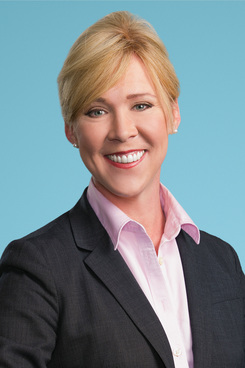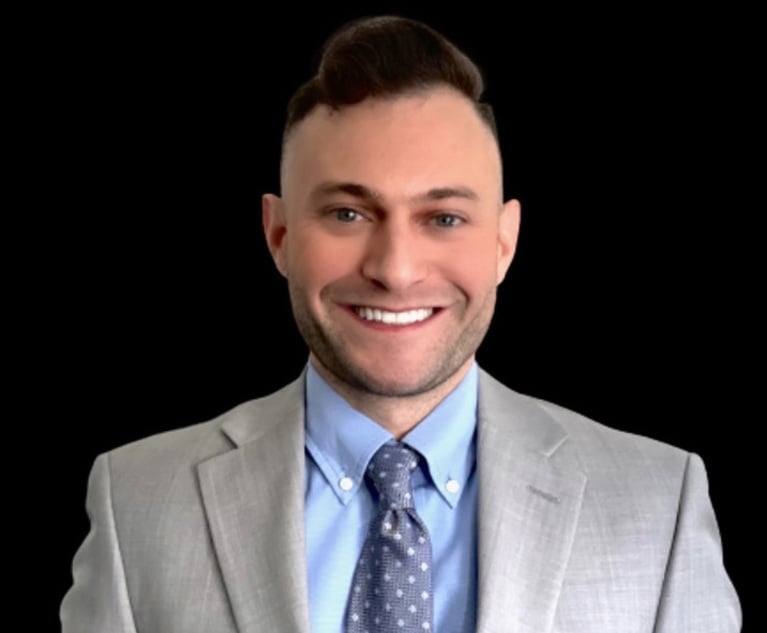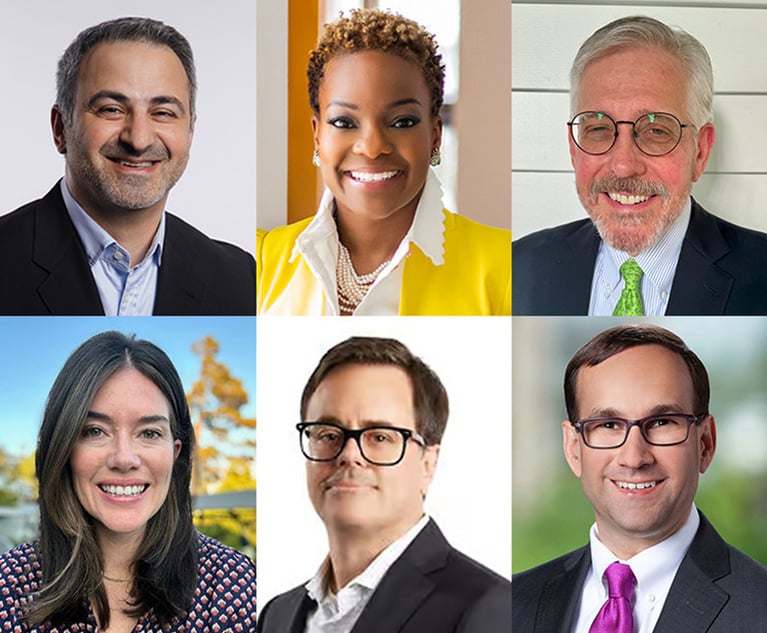Mental Health Care 2.0: What's Next in Healing Minds and Bodies of Legal Professionals?
The Chief Human Resources Officer at Pillsbury Winthrop Shaw Pittman writes that as human professionals and as human beings in a human industry, we must ask ourselves, "What are we going to do about this pervasive problem?"
February 03, 2020 at 12:15 PM
5 minute read
 Kathleen T. Pearson, chief human resources officer with Pillsbury Winthrop Shaw Pittman. (Courtesy photo.)
Kathleen T. Pearson, chief human resources officer with Pillsbury Winthrop Shaw Pittman. (Courtesy photo.)
News Flash—The legal profession is facing a crisis in mental health.
The numbers are staggering when compared to other industries and professions. Lawyers are 3.6 times more likely to experience a major depressive episode compared to the general population, according to the 2015 joint survey conducted by the American Bar Association and Hazelden Betty Ford Foundation. Remarkably, 45% of all lawyers have suffered from depression and 61% reported concerns about anxiety. Even more alarming, a whopping 11% reported suicidal thoughts at some point in their careers. By contrast, only 4% of the general population have had these thoughts. Thirty-two percent of lawyers under 30 are already problem drinkers.
As human professionals and as human beings in a human industry, we now must ask ourselves, "What are we going to do about this pervasive problem?"
Admittedly, we've been talking about it for years. That's a good first step as we strive to overcome the traditional stigmas attached to mental health care. Most firms have well-established employee assistance programs, or EAPs, that provide mental health services. Most large firm health plans also offer a range of inpatient and outpatient services.
So, is this working?
 Last year, Pillsbury's Health & Wellness team circulated a confidential engagement survey of our lawyers and staff to find out. We learned that far and away the number-one issue reported was stress. Clearly, our traditional offerings were not meeting the needs of our people.
Last year, Pillsbury's Health & Wellness team circulated a confidential engagement survey of our lawyers and staff to find out. We learned that far and away the number-one issue reported was stress. Clearly, our traditional offerings were not meeting the needs of our people.
Traditional EAPs work well for some situations, but we have very low utilization among our population for stress and mental wellbeing. Perhaps because it is hard to get services, especially for acute situations that need immediate assistance. Many providers were not taking new patients and those that did accept patients often had long waiting lists for appointments—sometimes several weeks out. To make matters worse, not all those providers ultimately matched the needs of their patients.
Fortunately, the health care market is responding. Today, several digital companies can provide patients with the names of available and personalized service providers with as few as three clicks of the mouse.
This January, Pillsbury became the first AmLaw 100 firm to launch a partnership with one of these digital health care providers. Our goal was to find a solution that would meet our population where they were at the exact time they needed care the most.
This unique program provides our entire population and their dependents 16 therapy sessions a year, at no cost, with appointments guaranteed within eight days or less—often much less. The program is completely confidential and outside of Pillsbury's traditional EAP or its health care providers. It provides what is called short-term, evidence-based therapy to help participants reach their goals quickly. Specialized therapists or coaches are paired with participants to fit their specific needs in any number of areas including stress, anxiety, depression, relationship issues, sleep disorders, substance abuse and other common issues. This program offers short-term solutions with "proven outcomes" and individuals can choose to meet in-person or virtually to ensure easy, seamless access.
Personally, I'm excited that Pillsbury is stepping out and doing something proactive. I'm also pleased to report that the program already seems to be resonating with our employees and partners.
Just three weeks after launching our new program, we have had a tremendous response with a significant number of sign-ups. In that short time, I have received emails from colleagues saying, "You literally just saved my life." That's amazing and heartening to hear. We are planning more robust internal communications on the program in the near future.
Of course, this new digital service is just one part of our multi-pronged approach. We're providing in-person and virtual meditation sessions once a week. We're talking about mindfulness, better interpersonal communications, stress management and creating boundaries. We're talking to our partners about how to better collaborate with our attorneys and staff. All of these efforts, just like all of our benefits, are provided to our entire population as we regard these as "human" issues that affect us all, regardless of role. And these messages are coming from the top, too. It's telling that our firm Chair David Dekker mentions mental wellness in each of his firmwide addresses. That's because the firm's leadership recognizes that we're a people profession first and foremost. If we don't take care of our people, we will cease to exist.
These approaches won't work at all firms and we're still in the initial stages here at Pillsbury but, hopefully, we can get closer to ending the stigma surrounding mental health care in the workplace and finding some creative solutions. We owe it to ourselves and we owe it to each other.
Kathleen Pearson is the chief human resources officer at Pillsbury Winthrop Shaw Pittman.
This content has been archived. It is available through our partners, LexisNexis® and Bloomberg Law.
To view this content, please continue to their sites.
Not a Lexis Subscriber?
Subscribe Now
Not a Bloomberg Law Subscriber?
Subscribe Now
NOT FOR REPRINT
© 2025 ALM Global, LLC, All Rights Reserved. Request academic re-use from www.copyright.com. All other uses, submit a request to [email protected]. For more information visit Asset & Logo Licensing.
You Might Like
View All
'Pull Back the Curtain': Ex-NFL Players Seek Discovery in Lawsuit Over League's Disability Plan

'Be Comfortable Being Uncomfortable': Pearls of Wisdom From 2024 GC Q&As


Insurers Dodge Sherwin-Williams' Claim for $102M Lead Paint Abatement Payment, State High Court Rules
Law Firms Mentioned
Trending Stories
- 1Departing Attorneys Sue Their Former Law Firm
- 2Pa. High Court: Concrete Proof Not Needed to Weigh Grounds for Preliminary Injunction Order
- 3'Something Else Is Coming': DOGE Established, but With Limited Scope
- 4Polsinelli Picks Up Corporate Health Care Partner From Greenberg Traurig in LA
- 5Kirkland Lands in Phila., but Rate Pressure May Limit the High-Flying Firm's Growth Prospects
Who Got The Work
J. Brugh Lower of Gibbons has entered an appearance for industrial equipment supplier Devco Corporation in a pending trademark infringement lawsuit. The suit, accusing the defendant of selling knock-off Graco products, was filed Dec. 18 in New Jersey District Court by Rivkin Radler on behalf of Graco Inc. and Graco Minnesota. The case, assigned to U.S. District Judge Zahid N. Quraishi, is 3:24-cv-11294, Graco Inc. et al v. Devco Corporation.
Who Got The Work
Rebecca Maller-Stein and Kent A. Yalowitz of Arnold & Porter Kaye Scholer have entered their appearances for Hanaco Venture Capital and its executives, Lior Prosor and David Frankel, in a pending securities lawsuit. The action, filed on Dec. 24 in New York Southern District Court by Zell, Aron & Co. on behalf of Goldeneye Advisors, accuses the defendants of negligently and fraudulently managing the plaintiff's $1 million investment. The case, assigned to U.S. District Judge Vernon S. Broderick, is 1:24-cv-09918, Goldeneye Advisors, LLC v. Hanaco Venture Capital, Ltd. et al.
Who Got The Work
Attorneys from A&O Shearman has stepped in as defense counsel for Toronto-Dominion Bank and other defendants in a pending securities class action. The suit, filed Dec. 11 in New York Southern District Court by Bleichmar Fonti & Auld, accuses the defendants of concealing the bank's 'pervasive' deficiencies in regards to its compliance with the Bank Secrecy Act and the quality of its anti-money laundering controls. The case, assigned to U.S. District Judge Arun Subramanian, is 1:24-cv-09445, Gonzalez v. The Toronto-Dominion Bank et al.
Who Got The Work
Crown Castle International, a Pennsylvania company providing shared communications infrastructure, has turned to Luke D. Wolf of Gordon Rees Scully Mansukhani to fend off a pending breach-of-contract lawsuit. The court action, filed Nov. 25 in Michigan Eastern District Court by Hooper Hathaway PC on behalf of The Town Residences LLC, accuses Crown Castle of failing to transfer approximately $30,000 in utility payments from T-Mobile in breach of a roof-top lease and assignment agreement. The case, assigned to U.S. District Judge Susan K. Declercq, is 2:24-cv-13131, The Town Residences LLC v. T-Mobile US, Inc. et al.
Who Got The Work
Wilfred P. Coronato and Daniel M. Schwartz of McCarter & English have stepped in as defense counsel to Electrolux Home Products Inc. in a pending product liability lawsuit. The court action, filed Nov. 26 in New York Eastern District Court by Poulos Lopiccolo PC and Nagel Rice LLP on behalf of David Stern, alleges that the defendant's refrigerators’ drawers and shelving repeatedly break and fall apart within months after purchase. The case, assigned to U.S. District Judge Joan M. Azrack, is 2:24-cv-08204, Stern v. Electrolux Home Products, Inc.
Featured Firms
Law Offices of Gary Martin Hays & Associates, P.C.
(470) 294-1674
Law Offices of Mark E. Salomone
(857) 444-6468
Smith & Hassler
(713) 739-1250






